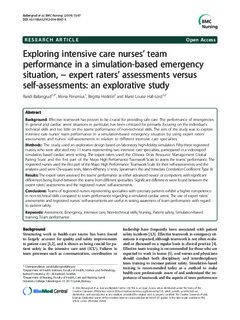| dc.contributor.author | Ballangrud, Randi | |
| dc.contributor.author | Persenius, Mona | |
| dc.contributor.author | Hedelin, Birgitta | |
| dc.contributor.author | Hall-Lord, Marie Louise | |
| dc.date.accessioned | 2017-10-25T14:17:39Z | |
| dc.date.available | 2017-10-25T14:17:39Z | |
| dc.date.created | 2015-02-05T09:24:37Z | |
| dc.date.issued | 2014 | |
| dc.identifier.citation | BMC Nursing. 2014, 13 (47), . | nb_NO |
| dc.identifier.issn | 1472-6955 | |
| dc.identifier.uri | http://hdl.handle.net/11250/2462202 | |
| dc.description.abstract | Background: Effective teamwork has proven to be crucial for providing safe care. The performance of emergencies in general and cardiac arrest situations in particular, has been criticized for primarily focusing on the individual’s technical skills and too little on the teams’ performance of non-technical skills. The aim of the study was to explore intensive care nurses’ team performance in a simulation-based emergency situation by using expert raters’ assessments and nurses’ self-assessments in relation to different intensive care specialties.
Methods: The study used an explorative design based on laboratory high-fidelity simulation. Fifty-three registered nurses, who were allocated into 11 teams representing two intensive care specialties, participated in a videotaped simulation-based cardiac arrest setting. The expert raters used the Ottawa Crisis Resource Management Global Rating Scale and the first part of the Mayo High Performance Teamwork Scale to assess the teams’ performance. The registered nurses used the first part of the Mayo High Performance Teamwork Scale for their self-assessments, and the analyses used were Chi-square tests, Mann–Whitney U tests, Spearman’s rho and Intraclass Correlation Coefficient Type III.
Results: The expert raters assessed the teams’ performance as either advanced novice or competent, with significant differences being found between the teams from different specialties. Significant differences were found between the expert raters’ assessments and the registered nurses’ self-assessments.
Conclusions: Teams of registered nurses representing specialties with coronary patients exhibit a higher competence in non-technical skills compared to team performance regarding a simulated cardiac arrest. The use of expert raters’ assessments and registered nurses’ self-assessments are useful in raising awareness of team performance with regard to patient safety. | nb_NO |
| dc.language.iso | eng | nb_NO |
| dc.publisher | BioMed Central | nb_NO |
| dc.rights | Navngivelse 4.0 Internasjonal | * |
| dc.rights.uri | http://creativecommons.org/licenses/by/4.0/deed.no | * |
| dc.title | Exploring intensive care nurses’ team performance in a simulation-based emergency situation, − expert raters’ assessments versus self-assessments: an explorative study | nb_NO |
| dc.type | Journal article | nb_NO |
| dc.type | Peer reviewed | nb_NO |
| dc.description.version | publishedVersion | nb_NO |
| dc.source.pagenumber | 10 | nb_NO |
| dc.source.volume | 13 | nb_NO |
| dc.source.journal | BMC Nursing | nb_NO |
| dc.source.issue | 47 | nb_NO |
| dc.identifier.doi | 10.1186/s12912-014-0047-5 | |
| dc.identifier.cristin | 1217217 | |
| dc.description.localcode | © 2014 Ballangrud et al.; licensee BioMed Central Ltd. This is an Open Access article distributed under the terms of the Creative Commons Attribution License (http://creativecommons.org/licenses/by/2.0), | nb_NO |
| cristin.unitcode | 194,18,23,20 | |
| cristin.unitname | Seksjon for sykepleie | |
| cristin.ispublished | true | |
| cristin.fulltext | original | |
| cristin.qualitycode | 1 | |

